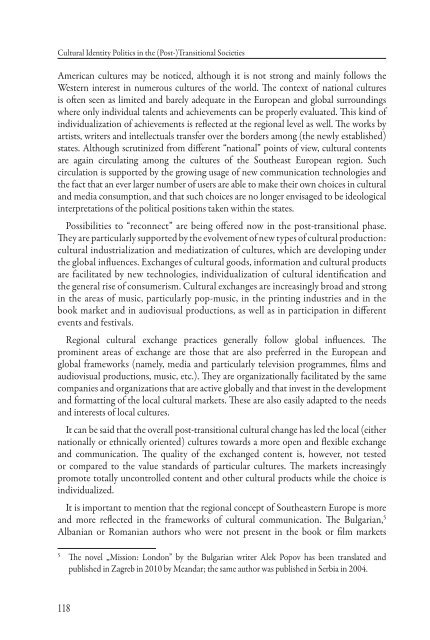Cultural Identity Politics in the (Post-)Transitional Societies
Cultural Identity Politics in the (Post-)Transitional Societies
Cultural Identity Politics in the (Post-)Transitional Societies
Create successful ePaper yourself
Turn your PDF publications into a flip-book with our unique Google optimized e-Paper software.
<strong>Cultural</strong> <strong>Identity</strong> <strong>Politics</strong> <strong>in</strong> <strong>the</strong> (<strong>Post</strong>-)<strong>Transitional</strong> <strong>Societies</strong><br />
American cultures may be noticed, although it is not strong and ma<strong>in</strong>ly follows <strong>the</strong><br />
Western <strong>in</strong>terest <strong>in</strong> numerous cultures of <strong>the</strong> world. The context of national cultures<br />
is often seen as limited and barely adequate <strong>in</strong> <strong>the</strong> European and global surround<strong>in</strong>gs<br />
where only <strong>in</strong>dividual talents and achievements can be properly evaluated. This k<strong>in</strong>d of<br />
<strong>in</strong>dividualization of achievements is reflected at <strong>the</strong> regional level as well. The works by<br />
artists, writers and <strong>in</strong>tellectuals transfer over <strong>the</strong> borders among (<strong>the</strong> newly established)<br />
states. Although scrut<strong>in</strong>ized from different “national” po<strong>in</strong>ts of view, cultural contents<br />
are aga<strong>in</strong> circulat<strong>in</strong>g among <strong>the</strong> cultures of <strong>the</strong> Sou<strong>the</strong>ast European region. Such<br />
circulation is supported by <strong>the</strong> grow<strong>in</strong>g usage of new communication technologies and<br />
<strong>the</strong> fact that an ever larger number of users are able to make <strong>the</strong>ir own choices <strong>in</strong> cultural<br />
and media consumption, and that such choices are no longer envisaged to be ideological<br />
<strong>in</strong>terpretations of <strong>the</strong> political positions taken with<strong>in</strong> <strong>the</strong> states.<br />
Possibilities to “reconnect” are be<strong>in</strong>g offered now <strong>in</strong> <strong>the</strong> post-transitional phase.<br />
They are particularly supported by <strong>the</strong> evolvement of new types of cultural production:<br />
cultural <strong>in</strong>dustrialization and mediatization of cultures, which are develop<strong>in</strong>g under<br />
<strong>the</strong> global <strong>in</strong>fluences. Exchanges of cultural goods, <strong>in</strong>formation and cultural products<br />
are facilitated by new technologies, <strong>in</strong>dividualization of cultural identification and<br />
<strong>the</strong> general rise of consumerism. <strong>Cultural</strong> exchanges are <strong>in</strong>creas<strong>in</strong>gly broad and strong<br />
<strong>in</strong> <strong>the</strong> areas of music, particularly pop-music, <strong>in</strong> <strong>the</strong> pr<strong>in</strong>t<strong>in</strong>g <strong>in</strong>dustries and <strong>in</strong> <strong>the</strong><br />
book market and <strong>in</strong> audiovisual productions, as well as <strong>in</strong> participation <strong>in</strong> different<br />
events and festivals.<br />
Regional cultural exchange practices generally follow global <strong>in</strong>fluences. The<br />
prom<strong>in</strong>ent areas of exchange are those that are also preferred <strong>in</strong> <strong>the</strong> European and<br />
global frameworks (namely, media and particularly television programmes, films and<br />
audiovisual productions, music, etc.). They are organizationally facilitated by <strong>the</strong> same<br />
companies and organizations that are active globally and that <strong>in</strong>vest <strong>in</strong> <strong>the</strong> development<br />
and formatt<strong>in</strong>g of <strong>the</strong> local cultural markets. These are also easily adapted to <strong>the</strong> needs<br />
and <strong>in</strong>terests of local cultures.<br />
It can be said that <strong>the</strong> overall post-transitional cultural change has led <strong>the</strong> local (ei<strong>the</strong>r<br />
nationally or ethnically oriented) cultures towards a more open and flexible exchange<br />
and communication. The quality of <strong>the</strong> exchanged content is, however, not tested<br />
or compared to <strong>the</strong> value standards of particular cultures. The markets <strong>in</strong>creas<strong>in</strong>gly<br />
promote totally uncontrolled content and o<strong>the</strong>r cultural products while <strong>the</strong> choice is<br />
<strong>in</strong>dividualized.<br />
It is important to mention that <strong>the</strong> regional concept of Sou<strong>the</strong>astern Europe is more<br />
and more reflected <strong>in</strong> <strong>the</strong> frameworks of cultural communication. The Bulgarian, 5<br />
Albanian or Romanian authors who were not present <strong>in</strong> <strong>the</strong> book or film markets<br />
5<br />
The novel „Mission: London” by <strong>the</strong> Bulgarian writer Alek Popov has been translated and<br />
published <strong>in</strong> Zagreb <strong>in</strong> 2010 by Meandar; <strong>the</strong> same author was published <strong>in</strong> Serbia <strong>in</strong> 2004.<br />
118




